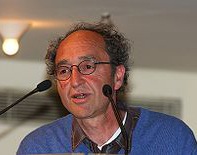Dogan Akhanli in Cologne
In the context of a week-long series of events in Germany in commemoration of the fourth anniversary of the assassination of Hrant Dink, a meeting was held in Cologne on January 16, organized by the Hrant Dink Forum – Köln , addressed also by Dogan Akhanli. A Turkish-born German citizen and novelist, Dogan was imprisoned by Turkish authorities from late August until early January on hoked-up charges of armed robby and murder.
Framed by magnificent musical offerings by pianist Anna Boghosian, opera singer Satik Toumian, and Kurdish signer Sakina, the large gathering heard greetings sent by Rakel Dink, who was herself engaged in similar ceremonies in Istanbul, and by Archbishop Karekin Bekjian. In his remarks the Archbishop declared that Hrant Dink was not really dead, in the sense that his example had inspired so many people, especially among youth. He referenced the very moving biography by Tuba Candar, who later spoke, and emphasized that almost all leading Turkish intellectuals were in touch with Hrant Dink. His Eminence related his view that, although Dink had a famous sense of humor, he was also a very sad person, because of his history and because Armenians are still being discriminated against. He reported on his trip to Syria in September of this year, when he visited Deir al Zor: he saw only sand: no trees, no plants, no animals, no life. He recommended that historians visit the place to recognize this had been no ‘secure’ place for Armenians. He also reported on a small shrine with bones of the victims, bones one can find by just scraping the surface of the sand. In conclusion, he expressed his conviction that the time would come when Dink’s assassins would be brought to justice.
The mayor of Cologne, a surprise guest, also said a few words, stressing the value of such gatherings to provide energy and courage to continue in the fight for democracy in Turkey. Dink, he said, was his role model.
Intermittently throughout the meeting, film clips were projected on a screen showing events from Dink’s life. Author Tuba Candar presented her new biography of Dink, which she characterized as a form of ‘therapy’ for herself and family friends. Reviewing the highpoints of his life, she cited his characterization of the Armenian experience as trauma, and that of the Turks as paranoia, as well as his message to the Armenian diaspora to focus more on the democratization process inside Turkey. In summarizing the events leading up to his death, she stressed his insistence on staying in his country, where he was also laid to rest.
The event concluded with a dialogue between Dr. Raffi Kantian of the German-Armenian Society and Dogan Akhanli. Dogan recalled his two meetings with Dink, in Cologne and in Yerevan, where they visited the genocide monument (film clips of this were shown). Dogan said, although the material perpetrator was a young fanatic, what killed Hrant Dink was Turkish arrogance and ignorance. He said he hadn’t understood Dink’s ideas until he heard him in person. ‘You committed a crime, don’t you know?’ he asked rhetorically, challenging the Turkish government and State to acknowledge the genocide. He said it was not his task to go to the Armenian diaspora, as Dink did, but as a Turk, to address the Turkish criminals.
Asked about his recent experience in prison, Dogan said it had shocked him deeply, as he saw how disrespectful and arbitrary the authorities acted. He said in the four months he was there, he saw only Kurdish prisoners; ‘the prisons there are reserved for Kurds.’ The Armenians, he said, are small and weak, and are either ignored or, if they become too strong, like Dink, are killed. But the Kurds, politically strong, are systematically jailed. This policy, he said, expressed the 100-year-old ‘Turkish project’ which says, “one land, one language, one nation,” the project that led to the genocide, the expulsion of the Greeks, and repression of the Kurds.
Regarding the reasons for his own arrest, he said he had constituted a problem for the authorities as a leftist underground activist earlier, then as a human rights activist and writer. He admitted that he had underestimate the danger for him when he returned to Turkey after decades in Germany, thinking it couldn’t be as bad today as it was then under the military dictatorship. After his release, he initially wanted to abandon anything Turkish, the country, the language, etc., but then realized that was perhaps the aim of his detention. So, he stayed after his release, went to visit his home village, where he was warmly welcomed by the people, and had the chance to visit family.
Then, he traveled to Istanbul, where he was able to present his book in public. This was wonderful! Whereas earlier he had seen himself as small Dogan in Cologne against the big Turkish State in all its arbitrary power, now he saw that in Turkey there was not only arbitrary power but there were also intellectuals willing to stand up for his rights. ‘Before, I could only speak in Cologne,’ he quipped, ‘now I can speak in Turkey.’ He stressed throughout that, had it not been for the mobilization in his defense, both in Germany and in Turkey, he would probably not have been released. Asked about the perspective for the future (his trial is to resume in March), he said his defense was optimistic, and that the prosecution had no chance. He concluded with a pledge that the small Dogan in Cologne would continue fighting the big powerful Turkish State, and would refuse to be treated like a puppet.
Needless to say, among the hundreds of attendants were many, many friends and associates of Dogan’s who celebrated his return with resounding applause. This week he is in Berlin for other events, while more commemorations will take place in Cologne.


